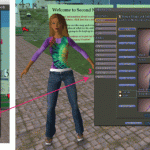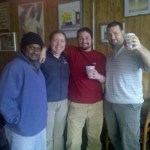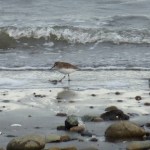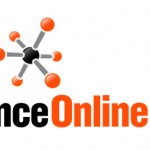ScienceOnline2010
Me (right) hypnotizing Carl Zimmer just before the Rebooting Science Journalism session at ScienceOnline 2010. It worked. Carl had planned to use his 5 minutes to just say, "We are DOOOMED." Instead he talked about duck sex.
I've been meaning for two weeks now to post on ScienceOnline 2010 and the Rebooting Science Journalism session, in which I joined Ed Yong, John Timmer, and Carl Zimmer as "unpanelists." Lest another frenzied week delay me further, here's my addition to the #scio10 #reboot corpus.
Journalists-v-bloggers is (almost) dead
Many at the conference, and pretty much everyone…
This past weekend's international science communication conference, ScienceOnline2010, also saw the first, final hardback copies of Rebecca Skloot's long-awaited book make it into the hands of the science and journalism consuming public. Moreover, an excerpt of The Immortal Life of Henrietta Lacks has just appeared in the new issue of Oprah Winfrey's O Magazine. And already, those online science communicators who left the conference with Skloot's book are registering their praise via this Twitter feed that was so active it was a trending topic at the science aggregator, SciencePond.
The story…
ScienceOnline 2010 was one of the most amazing meetings I've attended in a long time and it's going to take some time to process it all, but in the mean time, it seems other bloggers (phylogenomics, CogSci, and Ed) have started one of those meme things and so, here goes.
At ScienceOnline 2010, I learned:
More than I ever wanted to know about the intimate details of duck sex. courtesy of Carl Zimmer!
Likewise for dolphins. courtesy of Kevin Zelnio!
Why the instantiation of Baked Alaska will never be as good as the Platonic Ideal. (courtesy of Dr. Freeride)
What DNA Jesus would…
Okay, I'll grant that visiting Second Life can seem a bit uncomfortable, especially at first, but it does open some new doors and present an alternative to travel.
In flu season, virtual visits could be the next best thing to being there. (Yikes, that sounds like an ad. No more yahoo news for me!)
Here's where you can attend ScienceOnline 2010 in Second Life (http://slurl.com/secondlife/Research%20Triangle%20Park/128/129/25).
The next excuse might be that you don't know how to use Second Life or what to do. Never fear. That's a solvable problem.
I have a primer on attending a…
Is there a place for citizen scientists in the world of digital biology?
Many of the citizen science projects that I've been reading about have a common structure. There's a University lab at the top, outreach educators in the middle, and a group of citizens out in the field collecting data.
After the data are collected, they end up in a database somewhere and the University researchers analyze them and write papers. At least that's my impression so far.
It seems to me, that with all kinds of databases out there, on-line, there should be plenty of opportunity for both citizens and student…
A common theme I hear in talks on personalized medicine, is that increased access to genomic data and medical literature are changing the relationship between doctors and patients. Patients are through being passive recipients of paternalistic health care. They are demanding to participate and be treated as partners with health care providers.
Citizen science can serve a similar role.
Just as personalized medicine is starting to make it possible for individuals to monitor and participate in their own personal health, citizen science is making it possible for people to participate and…
For those of you following Twitter or watching the television in the university cafeteria, you'll know that the North Carolina port of Morehead City is being evacuated. Nine containers of an explosive, pentaerythritol tetranitrate (PETN), have been punctured and there is concern of an explosion. (This report now says that of the nine containers, only one has been punctured - by a forklift operator).
Not only do I have relatives out on the barrier island but science bloggers Kevin Zelnio and Southern Fried Scientist are stationed out there at the Duke University Marine Lab in Beaufort, about…
Do citizen science efforts ever go beyond "feel good" contributions? Do the data get published in peer-reviewed journals?
In an earlier post, I started a list of citizen science projects that allow students to make a contribution. Many commentors are graciously adding to that list and I thank you all! I'm glad to learn there are so many interesting projects and ways for people to get involved. Science is so empowering!
My question today concerns things like outcomes and deliverables. We'd like to assume that good things are coming from citizen science because people are involved, but I…
Next weekend at ScienceOnline2010, I'll be co-moderating a session on encouraging scientists and science trainees from underrepresented groups to participate in social media. I will be working with Damond Nollan, a social media specialist and Web Services Manager at North Carolina Central University (NCCU). Damond is the author of the aptly-titled blog, In The Mind of Damond Nollan. The whys and hows are what we hope to discuss in the outline below.
The reason for calling this the Martin Luther King Jr. Memorial Session stems from the fact that this conference has been held for the last four…
Next Saturday afternoon, at ScienceOnline2010, the science goddess, the chemspider, and I will be presenting a workshop on getting students involved in citizen science.
In preparation, I'm compiling a set of links to projects that involve students in citizen science. If you know of any good citizen science efforts, please share them in the comments.
Here we go!
Before I start listing links, I am limiting this list to projects that allow both students and citizen scientists to participate. I know of plenty of student projects, where students can isolate phage and annotate their genomes or…
Note: If you've read all of this at the conference website and just want to pay,
CLICK HERE.
For those of you attending ScienceOnline2010, I'm the one tending to the Saturday night banquet at the headquarters hotel, The Radisson at Research Triangle Park.
The banquet will be held following the Saturday 16 January sessions beginning at 7 pm.
The dinner was a great success last year with about 135 of the registrants attending and was a great way to unwind and continue some of the discussions we began.
This year, the supper will be followed by the Ignite session. For those who don't know,…
In the light of the Northwest Airlines "pantsbomber" episode and America's penchant for quick but poorly-thought out theatrical responses to such incidents, some international colleagues planning to attend ScienceOnline2010 have expressed some concern about the hassles they might encounter flying into our beloved burg in two weeks.
Preliminary accounts from the RDU International Airport suggest, however, that our local TSA and customs officials have maintained reason and restraint while also keeping travelers as safe as possible:
Paul Beach, an Air Force communications officer who flew into…
Welcome, fellow ScienceOnline2010 registrant! This is just the payment page; for more details on the banquet, CLICK HERE.
ScienceOnline2010 Saturday Night Dinner
Radisson at Research Triangle Park
Saturday 16 January 2010 - 7:00 pm
$37.50 (USD) per person
(includes $1.50 PayPal fee)
Who are you paying for?
Myself $37.50
Myself and 1 guest $75.00
Myself and 2 guests $112.50
Myself and 3 guests $150.00
Guest names, if any
Once your payment clears, I will mark you as paid on the list at the conference website.
If you are unable to use this method of advance…
Over the weekend, registration opened for ScienceOnline2010, the fourth annual science communicators conference to be held January 14-17, 2010, in the Research Triangle Park area of North Carolina.
Please join us for this free (but donations are accepted) three-day event to explore science on the Web. Our goal is to bring together scientists, physicians, patients, educators, students, publishers, editors, bloggers, journalists, writers, web developers, programmers and others to discuss, demonstrate and debate online strategies and tools for doing science, publishing science, teaching…
A couple of four years ago, a few dudes I just met around town had this idea to bring together a few bloggers who write about science. One was Anton Zuiker and the other was Bora Zivkovic, also known as Coturnix or He-Whose-Mind-Teh-Intertubes-Pass-Before-Going-Out-To-The-World. Anton also has a title, bestowed upon him by News & Observer columnist Dan Barkin back in 2007:
He's a quiet visionary. He's a low-key doer. He's a let's-get-together-and-see-where-this-goes guy. It's the Zuikers of this new, interwoven world who may play a significant role in determining how far Web 2.0 goes…




